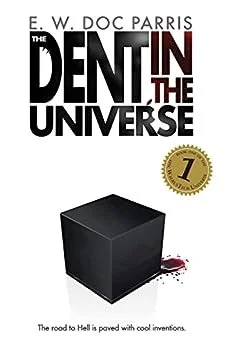SPSFC 3 Author Interview - E. W. Doc Parris
1. What inspired the world, characters, or core concepts of your story? Was it a particular event, piece of media, or a speculative scientific idea?
I was discussing the idea that it might be possible to send information into the past. What sort of limited time machine could that create? No time travel, just information, like a packet of IP data. As I was playing with that idea, the downside of our current tech culture started creating real life-threatening issues. The two merged in my head. What would a company like Facebook or Amazon do if someone in their organization developed a way to send IP traffic into the past? How responsibly would they handle that? What’s the worst outcome imaginable?
2. How did you approach the creation of your main characters? Were they modeled after real-life figures, or did they evolve organically as you explored the world of your story?
I was a fan of Steve Jobs all my adult life. He was a special kind of genius. These days, we’d call him the original head of product or product owner. He was the best there’s ever been at that. His vision was remarkable. But he was also a dick. Stephen Lucas, the main character of The Dent in the Universe, owes a lot to Jobs.
The book’s villain, the Monster, was based loosely on my late brother Scott, who suffered from untreated mental illness his whole life. Like many in that situation, they can have a lot of facets, some charming and appealing, others toxic and dangerous.
3. Science fiction often delves into questions of ethics, technology, and humanity. What central theme or moral question does your story grapple with, and why did you feel it was essential to explore?
The Dent in the Universe advances the fears expressed in Jurassic Park. “Your Scientists Were So Preoccupied With Whether Or Not They Could, They Didn’t Stop To Think If They Should.” Right? People running these billion-dollar tech firms are only thinking about making Wall Street happy. And these are the ethical giants experimenting with quantum computing and Artificial Intelligence. What else are their hardware gurus cooking up that we don’t know about yet?
4. How did you approach the integration of futuristic technology or scientific concepts in your story? Did you base them on existing theories or let your imagination run wild?
A lot of science fiction I see is still hanging onto scientific concepts that were made practically impossible in the 50s. I love Star Trek, but traveling faster than light has significant issues. Meanwhile, most of the really cool discoveries in quantum physics remain mostly unexplored because they’re so weird. I try to tell all of my stories with science that at least rhymes with the current scientific worldview.
5. The sci-fi genre provides a canvas to depict diverse cultures, species, and worlds. How have you incorporated representation and diversity in your work, and why do you think it's vital for the future of science fiction?
Book One of the WalrusTech Universe is grounded firmly in the current tech culture. How well does that culture honor Diversity, Equality, and Inclusion? How often does that culture examine their own privilege and inherent biases? After working in tech for over 40 years, I can tell you the answer. Not terribly well. One Corporation, the big tech company that plays a central role in the story, reflects my experiences in that world.
6. Every author has a unique writing process. Can you share a bit about yours? How do you manage world-building, plot progression, and character dynamics in such a complex genre?
I think about my stories for three years minimum before I start to think about writing. When a story I can’t ignore elbows to the front of my mind, I start writing scenes and plot ideas on post-it notes in no particular order—just ideas, moods, images, and vibes. Then, when I have enough post-its, I organize them on a board. Then I start to outline in Scrivener, and finally, I start to draft. Then, it’s about two years before I’m ready to publish.
7. What's next for you after SPSFC? Are there any upcoming projects you can share with us?
I’m on to Book 2, The Aurora’s Pale Light, due in May 2024. I’m also working on my first YA science-fiction novel, The Denial of Heroes, a superhero adventure. I’d like to have that ready for publication next Fall. Stay tuned!

